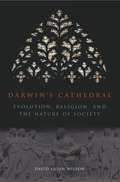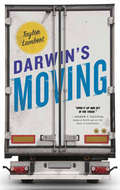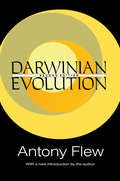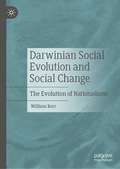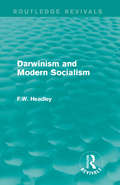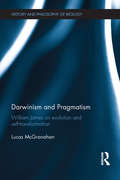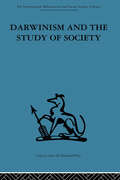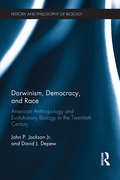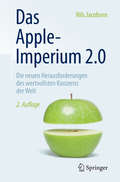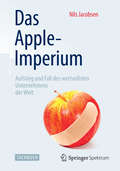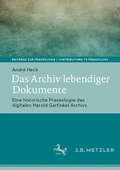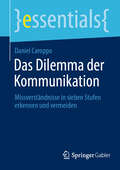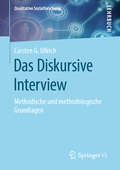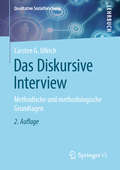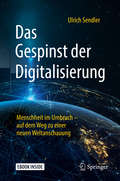- Table View
- List View
Darwin's Cathedral: Evolution, Religion, and the Nature of Society
by David Sloan WilsonA study examining the connection between religious faith and human evolution.“Thoughtful and provocative. . . . Wilson turns to religion, which, he claims, can be explained only by group selection. According to Wilson, a religion is the human equivalent of a pack of lions: by cooperating as a group, people attain benefits beyond their reach as individuals.”―Times Literary Supplement, Book of the YearOne of the great intellectual battles of modern times is between evolution and religion. Until now, they have been considered completely irreconcilable theories of origin and existence. David Sloan Wilson's Darwin's Cathedral takes the radical step of joining the two, in the process proposing an evolutionary theory of religion that shakes both evolutionary biology and social theory at their foundations.The key, argues Wilson, is to think of society as an organism, an old idea that has received new life based on recent developments in evolutionary biology. If society is an organism, can we then think of morality and religion as biologically and culturally evolved adaptations that enable human groups to function as single units rather than mere collections of individuals? Wilson brings a variety of evidence to bear on this question, from both the biological and social sciences. From Calvinism in sixteenth-century Geneva to Balinese water temples, from hunter-gatherer societies to urban America, Wilson demonstrates how religions have enabled people to achieve by collective action what they never could do alone. He also includes a chapter considering forgiveness from an evolutionary perspective and concludes by discussing how all social organizations, including science, could benefit by incorporating elements of religion.Religious believers often compare their communities to single organisms and even to insect colonies. Astoundingly, Wilson shows that they might be literally correct. Intended for any educated reader, Darwin's Cathedral will change forever the way we view the relations among evolution, religion, and human society.“As always, Wilson writes well and clearly and in a stimulating and provocative style. The book is interesting and important, and there can be no higher praise. . . . I applaud the approach taken by Wilson, and I urge you to read Darwin’s Cathedral.” — Science“Wilson's book is more than just an attempt to understand religion. Even to readers with no interest in either religion or science, his book can serve as a model of how to discuss controversial subjects honestly.” —New York Review of Books
Darwin's Moving
by Taylor LambertDarwin’s Moving introduces readers to the colourful characters who populate the furniture moving trade, a male-dominated world of labour with relatively high pay and no need for education of any sort. Movers have a unique window into the private spaces of the city as they perform their difficult and delicate job inside all manner of homes, from government-subsidized housing developments to multi-million dollar McMansions. Taylor Lambert intriguingly explores class and work in a city that would rather focus on the wealth and prosperity brought to it by the oil and gas industry. Darwin’s Moving shows us the Other Calgary, a world populated by transient men and women struggling to survive in a boomtown’s shadow. Darwin’s Moving takes us behind the scenes of a business that is almost completely undocumented in Canadian literature.
Darwinian Evolution
by Antony FlewIn little more than a hundred years the evolutionary theory of Charles Darwin has conquered the thinking world. No other body of ideas has enjoyed such unrivaled success. But precisely because of its scientific status, Darwinism has sometimes been invoked to sustain other ideas and beliefs with a much less solid foundation. Darwinian Evolution is a study of the historical background of Darwin's ideas, of their logical structure, and of their alleged and actual implications.Flew explores the Scottish Enlightenment, an important and often neglected aspect of Darwin's intellectual background. He compares Darwin with such figures as Adam Smith, Thomas Malthus, and Karl Marx, emphasizing not the similarities, but the differences between the natural and social sciences. Flew argues that social science must do what natural science does not: take account of individual choice. He examines the creationist controversy in Britain and the United States and discusses the possibility of a human sociobiology.In his new introduction, Flew updates his book by discussing relevant works that have appeared since it was published thirteen years ago. He discusses two different tendencies among both social scientists and those who develop or promote social policies according to various findings in the social sciences: (1) to assume there is no such thing as human nature; and (2) to take no account of the possibility that differences between sets of individuals may be genetically determined. Flew maintains that both these tendencies violate Darwin's theory. Darwinian Evolution is an intriguing study that should be read by sociologists, biologists, philosophers, and all those interested in the impact of Darwin and his work.
Darwinian Social Evolution and Social Change: The Evolution of Nationalisms
by William KerrThis book introduces the value of a Darwinian social evolutionary approach to understanding social change. The chapters discuss several different perspectives on social evolutionary theory, and go on to link these with comparative and historical sociological theory, and two case-studies. Kerr brings together social change theory and theories on nationalism, whilst also providing concrete examples of the theories at work. The book offers a vision of rapprochement between these different areas of theory and study, and to where this could lead future studies of comparative history and sociology. As such, it should be useful to scholars and students of nationalism and social change, sociologists, political scientist and historians.
Darwinism and Modern Socialism (Routledge Revivals)
by F.W. HeadleyAn adamant fan of Darwin, F.W. Headley attempts to argue the difficulties of believing in Socialism and Darwinism simultaneously and highlights issues which could prevent Socialism from being put into practice. Originally published in 1909, this study uses examples of communities in countries such as England and India to illustrate Headley’s key belief that societies only function well if they do not interfere with the fight for existence and natural selection. This title will be of interest to students of Philosophy, Sociology and Anthropology.
Darwinism and Pragmatism: William James on Evolution and Self-Transformation (History and Philosophy of Biology)
by Lucas McGranahanCharles Darwin’s theory of natural selection challenges our very sense of belonging in the world. Unlike prior evolutionary theories, Darwinism construes species as mutable historical products of a blind process that serves no inherent purpose. It also represents a distinctly modern kind of fallible science that relies on statistical evidence and is not verifiable by simple laboratory experiments. What are human purpose and knowledge if humanity has no pre-given essence and science itself is our finite and fallible product? According to the Received Image of Darwinism, Darwin’s theory signals the triumph of mechanism and reductionism in all science. On this view, the individual virtually disappears at the intersection of (internal) genes and (external) environment. In contrast, William James creatively employs Darwinian concepts to support his core conviction that both knowledge and reality are in the making, with individuals as active participants. In promoting this Pragmatic Image of Darwinism, McGranahan provides a novel reading of James as a philosopher of self-transformation. Like his contemporary Nietzsche, James is concerned first and foremost with the structure and dynamics of the finite purposive individual. This timely volume is suitable for advanced undergraduate, postgraduate and postdoctoral researchers interested in the fields of history of philosophy, history and philosophy of science, history of psychology, American pragmatism and Darwinism.
Darwinism and the Study of Society: A centenary symposium
by Michael BantonTavistock Press was established as a co-operative venture between the Tavistock Institute and Routledge & Kegan Paul (RKP) in the 1950s to produce a series of major contributions across the social sciences. This volume is part of a 2001 reissue of a selection of those important works which have since gone out of print, or are difficult to locate. Published by Routledge, 112 volumes in total are being brought together under the name The International Behavioural and Social Sciences Library: Classics from the Tavistock Press. Reproduced here in facsimile, this volume was originally published in 1961 and is available individually. The collection is also available in a number of themed mini-sets of between 5 and 13 volumes, or as a complete collection.
Darwinism, Democracy, and Race: American Anthropology and Evolutionary Biology in the Twentieth Century (History and Philosophy of Biology)
by David J. Depew John P JacksonDarwinism, Democracy, and Race examines the development and defence of an argument that arose at the boundary between anthropology and evolutionary biology in twentieth-century America. In its fully articulated form, this argument simultaneously discredited scientific racism and defended free human agency in Darwinian terms. The volume is timely because it gives readers a key to assessing contemporary debates about the biology of race. By working across disciplinary lines, the book’s focal figures--the anthropologist Franz Boas, the cultural anthropologist Alfred Kroeber, the geneticist Theodosius Dobzhansky, and the physical anthropologist Sherwood Washburn--found increasingly persuasive ways of cutting between genetic determinist and social constructionist views of race by grounding Boas’s racially egalitarian, culturally relativistic, and democratically pluralistic ethic in a distinctive version of the genetic theory of natural selection. Collaborators in making and defending this argument included Ashley Montagu, Stephen Jay Gould, and Richard Lewontin. Darwinism, Democracy, and Race will appeal to advanced undergraduates, graduate students, and academics interested in subjects including Philosophy, Critical Race Theory, Sociology of Race, History of Biology and Anthropology, and Rhetoric of Science.
Das Alter - Impulse für die bessere Hälfte
by Wolfgang BlohmVorurteile und Mythen des Alters hinterfragt: Der Autor Dr. Wolfgang Blohm lädt Sie ein, die Lebensphase des Altwerdens neu zu entdecken. Was erleben Sie bei der Lektüre? Statt Warten auf den Tod, Depression und Inkontinenz finden sich neue Bewertungen, Denkimpulse und immer auch ein Augenzwinkern. Wer am Älterwerden verzweifelt oder jedes graue Haar einzeln zählt, sollte “Das Alter – Impulse für die bessere Hälfte“ mit Neugierde lesen. Daneben empfiehlt sich die Lektüre für alle, die schon einmal einen Blick über den Zaun der Zukunft werfen möchten. Denn alt werden möchte fast jeder. Dieses Buch öffnet den Blick für viele neue Perspektiven auf die wichtigen lebensnahen Bereiche. Veränderungen lassen sich gestalten, Freiräume im Leben, im Lieben und im Wohnen sehr bekömmlich nutzen. Auch vermeintliche Tabus wie Sexualität, Verjüngungsmedizin oder das Lebensende können dabei ihre Scheu verlieren. Mehr als dreißig Jahre ärztliche und psychotherapeutische Erfahrung in der Praxis, in der eigenen Klinik und als mehrfacher Buchautor bringt Dr. med. Blohm neben seinem Lebensalter in dieses Buch mit ein
Das Apple-Imperium 2.0: Die neuen Herausforderungen des wertvollsten Konzerns der Welt
by Nils JacobsenDas Apple-Imperium 2. 0 Apple ist größer, wertvoller und mächtiger als je zuvor. Doch im Zenit der Macht liegt bekanntlich der Keim des Niedergangs. Wie andere Imperien in der Geschichte ist auch Apples scheinbar unangefochtene Regentschaft vom Verfall bedroht. Die Apple Watch, die erste neue Produktkategorie seit fünf Jahren, tut sich schwerer als erwartet. Und wie lange kann das iPhone eigentlich noch sein bemerkenswertes Wachstum fortsetzen? Das ,,Apple-Imperium 2. 0" beleuchtet Apple als Wirtschaftsunternehmen - und das vor allem in der Ära des neuen Regenten Tim Cook. Besichtigen Sie den wertvollsten Konzern der Welt, der sein Königreich mit aller Macht verteidigen will und sich dafür doch ein weiteres Mal neu erfinden muss. Der erfahrene Wirtschaftsjournalist und Apple-Experte Nils Jacobsen erzählt die packende Geschichte des beeindruckendsten Unternehmens unserer Zeit: Das Geheimnis des unglaublichen Apple-Erfolgs - und welchen Herausforderungen sich der Techpionier in Zukunft stellen muss. Der Autor Nils Jacobsen, Jahrgang 1974, ist ausgewiesener Apple-Experte und Wirtschaftsjournalist mit knapp 20-jähriger redaktioneller Erfahrung. Der gebürtige Hanseat verfolgt seit Mitte der 90er Jahre in unzähligen Artikeln Apples erstaunlichen Aufstieg zum wertvollsten Konzern aller Zeiten und die darauffolgenden Turbulenzen der Tim Cook-Ära. Jacobsen berichtet über Apple täglich beim Medienportal MEEDIA, in einer wöchentlichen Kolumne bei Yahoo Finance und zuvor in zahlreichen Artikeln für manager magazin online, SPIEGEL Online, WELT Online, das Hamburger Abendblatt, Mac Life und anderen bekannten Medien und Apple-Magazinen. www. facebook. com/DasAppleImperium
Das Apple-Imperium: Aufstieg und Fall des wertvollsten Unternehmens der Welt
by Nils JacobsenApple war größer, wertvoller und mächtiger als je zuvor. Doch im Zenit der Macht liegt bekanntlich der Keim des Niedergangs. Plötzlich erlebte der Kultkonzern aus Cupertino an der Börse einen beispiellosen Absturz - das jahrzehntelange Wachstum scheint an eine Grenze gestoßen zu sein. Wie andere Imperien in der Geschichte ist auch Apples scheinbar unangefochtene Regentschaft vom Verfall bedroht: Die Herausforderer rund um Googles Android-Betriebssystem, eigene Hybris und die Gesetze der kreativen Zerstörung könnten Apples Reich ins Wanken bringen. Vor allem scheint fraglich, ob CEO Tim Cook dem schweren Erbe Steve Jobs gewachsen ist und ob Apple auch ohne seinen ikonischen Gründer weiter für bahnbrechende Innovationen sorgen kann. Der erfahrene Wirtschaftsjournalist und Apple-Experte Nils Jacobsen erzählt die packende Geschichte des beeindruckendsten Unternehmens unserer Zeit: Das Geheimnis des unglaublichen Apple-Erfolgs - und wovon er in den nächsten Jahren bedroht werden könnte.
Das Archiv lebendiger Dokumente: Eine historische Praxeologie des digitalen Harold Garfinkel Archivs (Beiträge zur Praxeologie / Contributions to Praxeology)
by André HeckAls „Vater&“ der Ethnomethodologie war Harold Garfinkels übergreifendes Anliegen „the study of the everyday practices used by the ordinary members of society in order to deal with their day-to-day lives&”. Seine Herangehensweise und die Konzipierung der Ethnomethodologie entspringen fundamental einer Kritik an Auguste Comtes Individualismus, welche zuerst von Émile Durkheim vorgetragen und von Talcott Parsons weiterentwickelt wurde, welcher schließlich Garfinkels Dissertation an der Universität Harvard betreute. In den folgenden sieben Jahrzehnten wurde die Ethnomethodologie zu einer ebenso einflussreichen wie kontrovers diskutierten Strömung, nicht nur innerhalb der Soziologie, sondern in einer Vielzahl von Wissenschaftszweigen. Die vorliegende Arbeit zeigt, wie der Aufbau eines virtuellen Archivs basierend auf der Sammlung von Unterlagen aus Harold Garfinkels persönlichem Büro einen Beitrag zur Entwicklung einer „Sociological Theory of Information&“ in seinem Sinne leistet.
Das Bild in der Metapher: Bilder des Erfolgs – Bilder des Scheiterns
by Matthias JungeBilder und bildliche Vorstellungen bestimmen von der frühesten Kommunikation an unseren Zugang zur Welt. Das Ziel des Bandes ist eine umfassende Aufklärung der Prägung unserer Welt durch die verwendeten Bilder entlang ausgewählter Beispiele alltäglicher Bildlichkeit.
Das Bolsonaro-Paradox: Öffentlichkeit und Gegenöffentlichkeit der Rechten im heutigen Brasilien
by Camila Rocha Esther Solano Jonas MedeirosDieses Buch ist die erste gründliche wissenschaftliche Untersuchung einer der radikalsten Ausprägungen der aktuellen weltweiten Welle neuer rechter Bewegungen und Regierungen: die Bewegung, die den derzeitigen brasilianischen Präsidenten Jair Bolsonaro an die Macht gebracht hat. Der Aufstieg dieser neuen rechten Bewegung in Brasilien kam für viele Analyst*innen überraschend, die das Land bisher als erfolgreiches Beispiel für die Umsetzung einer fortschrittlichen Sozialpolitik im ersten Jahrzehnt des 21.Jahrhunderts betrachteten. Die Autor*innen dieses Bandes versuchen, einige dieser Fragen zu beantworten, indem sie die Ergebnisse einer umfangreichen Feldforschung vorstellen, die sie im Laufe der Jahre mit Bolsonaro-Anhänger*innen und Mitgliedern der neuen brasilianischen Rechtsbewegungen durchgeführt haben. Sie haben quantitative und vor allem qualitative Daten analysiert, um den beschleunigten Wandel der brasilianischen Öffentlichkeit zu begleiten, ausgehend von kleinen liberalen und konservativen Gruppen in den sozialen Medien hin zu einem größeren Publikum über Buchverlage, das Bildungssystem, die Mainstream-Medien und das politische Parteiensystem.
Das Burnout-Syndrom: Theorie der inneren Erschöpfung - Zahlreiche Fallbeispiele - Hilfen zur Selbsthilfe
by Matthias BurischDer Lehrer, der eines Tages keinen Schritt mehr in die Schule setzen kann, die Managerin, die sich morgens schon geschafft wie nach einem 12-Stunden-Tag fühlt, der Krankenpfleger, der nur noch zynisch über seine Patienten spricht - sie alle könnten unter Burnout leiden. Burnout ist ein Phänomen, das in jedem Beruf und in beinahe jeder Lebenslage auftreten kann: bei Lehrern und Pflegepersonal, bei Künstlern und Entwicklungshelfern, aber auch bei Ingenieuren und Professorinnen. Und die ersten Stadien haben fast alle schon einmal erlebt. Burisch hat als Experte für die Thematik eine umfassende Theorie des Burnout-Syndroms entwickelt, die er auf sehr lebendige und mit Fallbeispielen veranschaulichte Weise darstellt. Dabei spricht er sowohl Fachleute als auch Betroffene an - trotz hohen theoretischen Niveaus verliert er nie den Bezug zu Alltagserfahrungen aus dem Auge. Geschrieben für Betroffene und Interessierte, klinische Psychologen, psychologische und ärztliche Psychotherapeuten, Arbeits- und Organisationspsychologen, Mitarbeiter in Beratungsstellen.
Das Dilemma der Kommunikation: Missverständnisse in sieben Stufen erkennen und vermeiden (essentials)
by Daniel CaroppoKommunikation ist allgegenwärtig – und doch bleibt sie oft wirkungslos oder wird missverstanden. Warum? Weil zwischen dem, was gedacht, gesagt, gehört und verstanden wird, viele unbemerkte Brüche entstehen. Dieses essential analysiert sieben typische Brüche im Kommunikationsprozess – und zeigt anhand von Beispielen und Lösungen, wie Kommunikation gezielter gelingt. Anhand eines praxisorientierten 7-Stufen-Modells beschreibt Daniel Caroppo, wie aus einer gut gemeinten Botschaft ein echtes Missverständnis werden kann – und welche konkreten Strategien helfen, Klarheit, Vertrauen und Wirksamkeit zurückzugewinnen. Ob im Team, im Führungskontext, in Schule, Medizin oder digitaler Kommunikation: Wer die Dynamik hinter Missverständnissen versteht, kommuniziert bewusster, empathischer – und erfolgreicher.
Das Diskursive Interview: Methodische und methodologische Grundlagen (Qualitative Sozialforschung)
by Carsten G. UllrichDas Buch befasst sich mit dem Diskursiven Interview, einer qualitativen Interviewmethode, die ursprünglich für die Erfassung und Rekonstruktion sozialer Deutungsmuster entwickelt wurde. Es werden die zentralen methodologischen Annahmen erläutert und alle methodischen Schritte dieser umfassenden Forschungsmethode dargelegt (insbesondere Sampling, Leitfadenentwicklung, Interviewführung, rekonstruktive Analyse, Typenbildung, Qualitätssicherung). Besonderes Gewicht wird dabei auf die Rolle von Fragen und Fragetechniken gelegt, weil diese für die Aufdeckung von Deutungsmustern von zentraler Bedeutung sind. Der InhaltDeutungsmuster und Deutungsmusteranalyse ● Theoretische du methodologische Grundannahmen des Diskursiven Interviews ● Datenerhebung mit Diskursiven Interviews ● Rekonstruktiv-kontrastierende Auswertung Diskursiver Interviews ● Qualitätssicherung beim Diskursiven Interview Der AutorDr. Carsten G. Ullrich hat die Professur für Methoden der qualitativen Sozialforschung an der Fakultät für Bildungswissenschaften der Universität Duisburg-Essen inne.
Das Diskursive Interview: Methodische und methodologische Grundlagen (Qualitative Sozialforschung)
by Carsten G. UllrichDas Buch befasst sich mit dem Diskursiven Interview, einer qualitativen Interviewmethode, die ursprünglich für die Erfassung und Rekonstruktion sozialer Deutungsmuster entwickelt wurde. Es werden die zentralen methodologischen Annahmen erläutert und alle methodischen Schritte dieser umfassenden Forschungsmethode dargelegt (insbesondere Sampling, Leitfadenentwicklung, Interviewführung, rekonstruktive Analyse, Typenbildung, Qualitätssicherung). Besonderes Gewicht wird dabei auf die Rolle von Fragen und Fragetechniken gelegt, weil diese für die Aufdeckung von Deutungsmustern von zentraler Bedeutung sind. Der InhaltDeutungsmuster und Deutungsmusteranalyse ● Theoretische und methodologische Grundannahmen des Diskursiven Interviews ● Datenerhebung mit Diskursiven Interviews ● Zur Auswertung Diskursiver Interviews ● Qualitätssicherung beim Diskursiven Interview Der AutorDr. Carsten G. Ullrich hat die Professur für Methoden der qualitativen Sozialforschung an der Fakultät für Bildungswissenschaften der Universität Duisburg-Essen inne.
Das Ende der Heterodoxie?: Die Entwicklung der Wirtschaftswissenschaften in Deutschland (Wirtschaft + Gesellschaft)
by Arne Heise Henrike Sander Sebastian ThiemeIn dem vorliegenden Buch wird die Entwicklung nach der Reformphase deutscher Universit#65533;ten in den 1960er und 1970er Jahren, die im Zuge der Studentenbewegung eine Pluralisierung der #65533;konomik ansto#65533;en wollte, aufgearbeitet und die Gr#65533;nde f#65533;r die Marginalisierung alternativer #65533;konomischer Theorien offengelegt.
Das Experiment in der Kommunikations- und Medienwissenschaft: Grundlagen, Durchführung und Auswertung experimenteller Forschung (Studienbücher zur Kommunikations- und Medienwissenschaft)
by Thomas Koch Christina Peter Philipp MüllerDas Lehrbuch bietet einen umfassenden Überblick über das sozialwissenschaftliche Experiment. Es stellt Grundlagen und zentrale Begriffe vor und dient als praktischer Leitfaden, um Experimente durchzuführen. Mit zahlreichen Beispielen aus der Kommunikationswissenschaft liefert dieses Buch eine umfassende Hilfestellung für Methodenkurse und empirische Forschungsprojekte, die sich der experimentellen Forschung widmen.
Das Formular (AdminiStudies. Formen und Medien der Verwaltung #1)
by Niels Werber Peter Plener Burkhardt WolfWenn stimmt, was bereits Friedrich Schiller beklagt hat: dass der Mensch in der modernen Gesellschaft „zum Formular geworden“ ist, dann steht mit diesem unscheinbaren Verwaltungs-tool nichts weniger als unsere Lebenswirklichkeit auf dem Spiel. Der erste (Open Access-)Band der Reihe AdminiStudies beschäftigt sich deshalb mit der Funktion und Geschichte von Formularen, jenen institutionalisierten Lückentexten, die den Alltag der Bürger dadurch entscheidend prägen, dass sie die Befehlsgewalt des Staats und seinen Willen zum Wissen auf zwingende Weise verschränken. Von Blanketten und handgeschriebenen Formularbüchern über Vordrucke zur militärischen und steuerlichen Erfassung bis hin zu den Telegramm-Vorlagen des 19. Jahrhunderts und zu den digitalen Schreibfeldern heutiger Ämter und Social Media reicht die Macht- und Mediengeschichte des Formulars. Die Grenze zwischen Untertanen, Bürgern und Kunden ist durchlässig geworden, und an den Affordanzen digitaler Formulare lassen sich die gegenwärtigen Bauformen administrativer Herrschaft ablesen.
Das Führungsteam: Wie wirksame Kooperation an der Spitze gelingt
by Olaf HinzEinsame Helden in den Chefetagen - das ist weder zeitgemäß noch erfolgversprechend, denn die Themen sind zu vielfältig, die Fragestellungen zu komplex und die zu treffenden Entscheidungen zu zahlreich. Führungsteams sind auf dem Vormarsch - und sie sind nicht nur erfolgreicher, sondern auch gelassener und zufriedener. Wie aber können Manager ein wirksames Team bilden und ihre Unterschiede bewusst nutzen, ohne ihren individuellen Erfolg zu vernachlässigen? Olaf Hinz gibt Denkanstöße, konkrete Anregungen und liefert einen praxiserprobten Prozess, wie ein wirksames Führungsteam entsteht. Er zeigt die notwendige Haltung und behandelt auch die Themen Macht, Einfluss, Unternehmenspolitik und Eitelkeiten.
Das Gelingen von Anpassungsprozessen an den Klimawandel: Instrumente, Strategien und mediative Methoden der Prozessbegleitung im öffentlichen Bereich
by Christa Fischer-KorpDieses Buch gibt Hilfestellungen für Gemeinden, um die mit dem Klimawandel verbundenen Herausforderungen zu meistern und dabei alle Interessensgruppen zu beteiligen. Fast alle Gemeinden stehen vor der Frage, wie die Anpassung an den Klimawandel für die Bürger vonstattengehen soll. Jede Gruppe, jede Institution, jeder Betrieb wird Bedürfnisse artikulieren und die eigenen Interessen verteidigen. Das Buch zeigt auf, wie in den Kommunen Konfliktfähigkeit hergestellt werden kann, wie die Herausforderungen für Gemeinden und Regionen analysiert und maßgeschneiderte Strategien für den Anpassungsprozess entwickelt werden können. Der Anpassungsprozess an den Klimawandel muss so gestaltet werden, dass Bedürfnisse beachtet werden und Interessen nach Möglichkeit ausgeglichen sind. Es braucht Kooperationen, Innovationen und den Blick für Synergien, um diese Aufgabe zu bewältigen. Ein besonderer Schwerpunkt liegt hier auf der Begleitung und Unterstützung durch Mediatoren. Die Autorin gibt den Verantwortlichen zahlreiche Praxisbeispiele, Analyse-Tools und Checklisten an die Hand. Damit wendet sich das Buch vor allem an Bürgermeister, Gemeindeverantwortliche, Klimabeauftragte, Anbieter von „grünen“ Projekten und an alle, die wollen, dass die Anpassung an den Klimawandel gelingt.
Das Gespinst der Digitalisierung: Menschheit im Umbruch – auf dem Weg zu einer neuen Weltanschauung
by Ulrich SendlerÜbernehmen bald die Roboter? Hat die Menschheit noch eine Zukunft? Und was hat das mit der Ausbreitung des Populismus zu tun? Das Buch spannt einen Bogen von der Digitalisierung zu aktuellen gesellschaftspolitischen Umbrüchen. Übersichtlich strukturiert und leicht verständlich geschrieben, hilft das Buch Lesern, das Wesen der digitalen Transformation zu begreifen – unter anderem, indem es Parallelen zur industriellen Revolution aufzeigt. Für seine Analyse verknüpft der Autor die Digitalisierung mit politischen, historischen, wirtschaftlichen, soziologischen und philosophischen Fragestellungen.Nach seiner Analyse gehen die gegenwärtigen Angriffe auf die Demokratie und deren schwache Abwehr in den Industrieländern nicht zufällig mit der Digitalisierung von Wirtschaft und Industrie einher: Sie sind zwei Seiten derselben Medaille. In seinem Rückblick auf die Geschichte zeigt er, auf welche Art und Weise gesellschaftliche Phänomene wie Klassenkampf, Nationenbildung und Demokratisierung mit dem Industriezeitalter verwoben sind. Er beschreibt, wie die Digitalisierung spätestens seit den Siebzigerjahren des 20. Jahrhunderts mit der massenhaften Herstellung von Mikrochips die Welt erobert. Diese Entwicklung ist so weit fortgeschritten, dass mittlerweile fast alle privaten und öffentlichen Bereiche des Lebens von der Digitalisierung geprägt sind. Ulrich Sendler verknüpft seine Schilderung mit politisch-gesellschaftlichen Umbrüchen, von der Revolte der 68er bis zum neoliberalen Gesellschaftsentwurf. Der Begriff Digitalisierung, so seine These, beschreibt den Übergang der Gesellschaft zu etwas Neuem, das durch die Allgegenwart des Digitalen bestimmt sein wird. Und diese Transformation könnte sich, ebenso wenig wie die Industrialisierung, nicht ohne Revolten vollziehen. Das Buch sagt nicht vorher, was auf uns zukommt. Es stellt Zusammenhänge her, hilft aktuelle Entwicklungen zu verstehen und sich eine eigene Meinung zu bilden. Ulrich Sendler, seit mehr als drei Jahrzehnten als Fachjournalist, Technologieanalyst und Autor rund um die Digitalisierung der Industrie tätig, will eine Debatte über das anbrechende digitale Zeitalter anstoßen. Damit richtet sich das Buch nicht nur an Politiker, Wissenschaftler und Praktiker, sondern insbesondere an interessierte Bürger.
Das Google+ Buch
by Annette SchwindtVon vielen sehnsüchtig erwartet: Die übersichtliche und umfassende Anleitung zu Google+ von der Autorin des Bestsellers "Das Facebook-Buch", Annette Schwindt. Google+ ist so schnell durchgestartet wie keine andere Social Media-Plattform zuvor. Immer mehr Menschen tummeln sich in dem noch jungen sozialen Netzwerk und können dabei immer mehr von der Integration zentraler Google-Dienste wie der Suche profitieren. Wie das geht, erklärt Annette Schwindt ebenso wie die Einrichtung des Profils, die richtigen Privatsphäreeinstellungen, Google+-spezifische Aktivitäten wie Hang-outs und vieles mehr.
